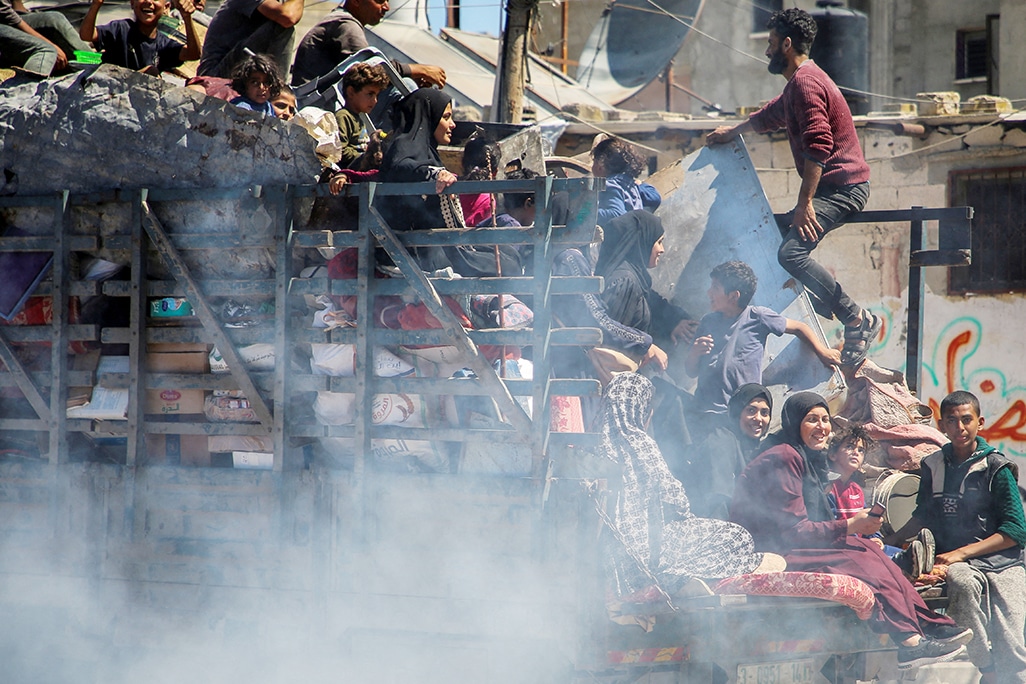Hamas battled Israeli troops on the outskirts of the Gaza Strip’s crowded southern city of Rafah on Wednesday and Washington said it had held up a shipment of powerful bombs to Israel to prevent civilian casualties.
The United States, which aims to stave off a full Israeli invasion of Rafah, said it believes a revised Hamas ceasefire proposal may lead to a breakthrough in an impasse in negotiations, with talks resuming in Cairo on Wednesday.
Israeli tanks rolled across the Rafah border crossing between Gaza and Egypt on Tuesday, cutting off a vital aid route and the only exit for the evacuation of wounded patients.
A U.N. official said no fuel or aid had entered the Gaza Strip due to the military operation, a situation “disastrous for the humanitarian response” in Gaza where more than half the population is suffering catastrophic hunger.
Israel has threatened a major assault on Rafah to defeat thousands of Hamas fighters it says are holed up there. But the city is also a refuge for hundreds of thousands of Palestinians who have fled combat further north in the enclave.
They have crammed into tented camps and makeshift shelters, suffering from shortages of food, water and medicine. Rafah’s main maternity hospital, where nearly half of Gaza’s births take place, has stopped admitting patients, the United Nations Population Fund told Reuters on Wednesday.
Hamas said its fighters were battling with Israeli forces in the east and Islamic Jihad’s fighters attacked Israeli soldiers and military vehicles with heavy artillery near the airport.
“The streets of the city echo with the cries of innocent lives lost, families torn apart, and homes reduced to rubble. We stand on the brink of a humanitarian catastrophe of unprecedented proportions,” Rafah’s mayor, Ahmed Al-Sofi, said in an appeal to the international community to intervene.
A senior U.S. official, speaking on condition of anonymity, said Washington had carefully reviewed the delivery of weapons that might be used in Rafah, and as a result paused a shipment consisting of 1,800 2,000-lb bombs and 1,700 500-lb bombs.
This would be the first such delay since the Biden administration, offered its “ironclad” support to Israel after Hamas’ Oct. 7 attack. Washington is Israel‘s closest ally and main weapons supplier.
U.S. Defense Secretary Lloyd Austin said the decision was taken in the context of Israel‘s plan to carry out an offensive in Rafah that Washington opposes without civilian safeguards.
“We’ve been very clear … from the very beginning that Israel shouldn’t launch a major attack into the Rafah without accounting for and protecting the civilians that are in that battlespace,” he told a Senate hearing.
An Israeli government spokesperson said he had nothing to add to the reports.
The Israeli military said it had uncovered Hamas infrastructure in several locations in eastern Rafah and its troops were conducting targeted raids on the Gaza side of the Rafah crossing and airstrikes across the Gaza Strip.
It has told civilians, many of whom have been uprooted several times already, to go to an “expanded humanitarian zone” in al-Mawasi, some 20 km (12 miles) away. The mayor said the coastal area lacked all “the necessities of life”.
Around 10,000 Palestinians have left Rafah since Monday, said Juliette Touma, spokesperson for UNRWA, the U.N. agency for Palestinian refugees. The Hamas-run Gaza government media office put the number at tens of thousands.
“Some streets look like a ghost town now,” Aref, 35, told Reuters via a chat app. “We don’t fear death and martyrdom but we have kids to care for and live for another day when this war ends and we rebuild the city.”
Armed groups of Hamas, Islamic Jihad and Fatah said in separate statements that gunfights continued in the central Gaza Strip, while residents of northern Gaza reported heavy Israeli tank shelling against eastern areas of Gaza City.
CEASEFIRE TALKS
In Cairo, delegations to negotiations from Hamas, Israel, the U.S., Egypt and Qatar reacted positively to their resumption on Tuesday, two Egyptian sources said. “The talks are ongoing,” White House spokesperson Karine Jean-Pierre told reporters on Air Force One on Wednesday.
CIA Director William Burns travelled from Cairo to Israel on Wednesday and met Israeli Prime Minister Benjamin Netanyahu, an Israeli official said.
Israel on Monday declared that a three-phase proposal approved by Hamas was unacceptable because terms had been watered down. White House spokesperson John Kirby said a new text presented by Hamas suggests gaps could be closed.
The proposal included a first phase with a six-week ceasefire, an influx of aid to Gaza, the return of 33 Israeli hostages, alive or dead, and the release by Israel of 30 detained Palestinian children and women for each released Israeli hostage, according to several sources.
Israel‘s offensive has killed 34,844 Palestinians in seven months of war in Gaza, most of them civilians, the Gaza health ministry said.
The war began when Hamas militants attacked Israel on Oct. 7, killing about 1,200 people and abducting 252 others, of whom 128 remain hostage in Gaza and 36 have been declared dead, according to the latest Israeli figures.
UNRWA said no aid was getting into Gaza, despite desperate need. “We’re not receiving any aid into the #GazaStrip,” Scott Anderson, deputy director at UNRWA Affairs in Gaza, posted on X.
Israel said it was reopening the other crossing in southern Gaza, Kerem Shalom, but two Red Crescent sources said aid was still waiting on the Egyptian side of the border on Wednesday afternoon.







Click here to change your cookie preferences